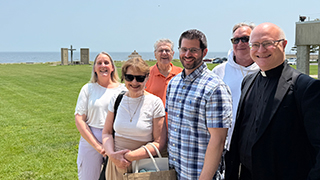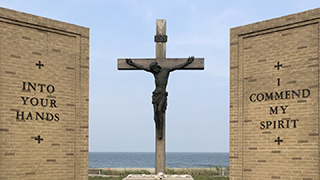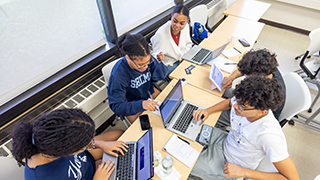Faculty Enjoy Summer Retreat on the Shore
Monday, June 23, 2025
 It is no secret that our students look forward to summer break. After weeks of navigating
classes, papers, exams and the inevitable crunch of finals, the academic year comes
to a close, and many find time to take a breath. Summer plans, even those of work
and perhaps summer classes, bring about a different vibe as the excitement of commencement
serves as a reminder of the bright future that awaits them. However, there is another
group of our Seton Hall community that also anxiously awaits the end of the semester
— our faculty. For faculty, however, the semester does not end on the last day of
finals. The short, often stressful, period between final exams and grading deadlines
is the final hurdle in their decathlon-like semester.
It is no secret that our students look forward to summer break. After weeks of navigating
classes, papers, exams and the inevitable crunch of finals, the academic year comes
to a close, and many find time to take a breath. Summer plans, even those of work
and perhaps summer classes, bring about a different vibe as the excitement of commencement
serves as a reminder of the bright future that awaits them. However, there is another
group of our Seton Hall community that also anxiously awaits the end of the semester
— our faculty. For faculty, however, the semester does not end on the last day of
finals. The short, often stressful, period between final exams and grading deadlines
is the final hurdle in their decathlon-like semester.

San Alfonso Retreat Center in Long Branch, NJ
In an effort to provide a transition period from the active, and often hectic, intellectual
grind of a university professor to a hopefully more relaxed summer, the university
Committee on the Catholic Intellectual Tradition and the Center for Catholic Studies
created the annual Summer Faculty Retreat. Falling in a “sweet spot” between grading
and beginning summer projects, the retreat is offered for faculty, by faculty and
engages intellectual, spiritual and practical experiences through reflection, prayer,
presentations and conversation.
Offered for its third year, faculty experienced this overnight academic retreat from
June 5-6 at San Alfonso Retreat Center in Long Branch, NJ. Located on a beautiful
ocean front property, this retreat center provided the perfect setting for our faculty
to decompress, pray and connect with colleagues.
In light of the 10th anniversary of Pope Francis’s encyclical, Laudato Si, on care for our common home, faculty focused a number of talks and reflections on
key themes from the document. While known mostly for its sections related to caring
for God’s creation, ecology and sustainability, presentations also uncovered some
lesser known, but crucial tenets of the document. Broken into four sessions guided
by Seton Hall faculty from various disciplines, personal and professional testimonies
fostered ongoing conversations throughout the day and a half retreat.
Core Fellow, Thomas Seat, Ph.D., offered the first session “Cry of the Earth, Cry of the Poor, Cry of Our
Students.” During his talk, Seat explained that several studies point out how many
young adults around the world are deeply concerned about climate change, which allows
Pope Francis’s charge to care for the earth to resonate with a number of Seton Hall
students in Core II courses. He also shared examples of students who resonated with
Pope Francis’s interpretation of the creation narrative as tasking people with caring
for, and not dominating, our common home. Many students, he explained, also connect
with, and are surprised by, the strong social teaching in Laudato Si’, in which Pope Francis intertwines ecological and social justice by linking care
for the earth with care for impoverished persons.
Participating in the retreat for the first time, Seat exclaimed,
The retreat was a wonderful experience — a way to connect with faculty in other departments and engage in meaningful conversations about how we can best serve our students, all amidst refreshing ocean breezes. I returned to Seton Hall with renewed energy for teaching and writing.
Associate Professor of History and chair of the university’s Sustainability Committee, Thomas Rzeznik, Ph.D., led the second session, “Ecological Conversion and Educational Challenge.” Rzeznik discussed Pope Francis’s call for institutions to engage in what is known as the Laudato Si Action Plan, which Seton Hall signed in 2021 and is seeking to engage in more deeply through our new Strategic Plan. Through the example of his most current research and upcoming book on St. Vincent’s Catholic Hospital in New York, Rzeznik reminded his fellow faculty that mission statements and action plans are simply words unless they are lived out within the ethos of the institution. The discussion that followed the talk included various examples of how Seton Hall lives out her mission through various initiatives and service opportunities, as well as ways in which it could be enhanced and encouraged.
Continuing the discussion of service, the third session included a panel of faculty
members whose disciplines are naturally service-oriented, such as social work, nursing,
and other health sciences. In the session, “Giving What We Have Received: A Look at
Service,” faculty heard personal and professional stories from Josephine Devito, Ph.D., R.N., from the School of Nursing, Genevieve Zipp, P.T., Ed.D., FNAP, from Health Sciences, and Mary Landriau, MSW, LCSW from the Department of Social Work. This session included moving testimonies
about the dignity of human life from conception to natural death along with a call
to create a culture of care by receiving others in charity. Fruitful discussions followed
about how we can implement this culture at Seton Hall, beginning with faculty-student
relationships.
One of the panelists, Mary Landriau, spoke of her experience on the retreat and shared,
The Seton Hall Summer Faculty Retreat offered a meaningful pause to reflect on our shared vocation as educators rooted in compassion and service. I found great value in the space it created for dialogue, renewal, and connection with colleagues across disciplines. It reinforced the importance of integrating care into both our pedagogy and our presence within the Seton Hall community. It was wonderful to have the time and space as faculty members to remember our "why," our vocation as educators.
The first evening concluded with Mass and time for prayer, followed by evening hospitality,
including refreshments, drinks, and fraternal conversation while overlooking the ocean.
After a restful night, participants met for the final session, led by Father Brian Muzas, minister to the Seton Hall Priest community and Assistant Professor of Diplomacy
and International Relations. Father Muzas led an engaging conversation about what
Pope Francis called the “technocratic paradigm.” By looking at “AI, International
Relations, and Catholicism,” Father Muzas spoke of the motivations behind some of
the great minds of AI, its threats, and what the Church can teach us as we navigate
this reality at Seton Hall.
Throughout the thirty-hour retreat, participants entered into times of prayer, silence
and reflection. In addition to gathering for Mass, retreatants were guided through
a series of reflections inspired by St. Francis of Assisi and led by Patrick Manning, Ph.D., of Immaculate Conception Seminary School of Theology and director of the
Center for Catholic Studies. Additionally, Matthew Higgins, Ed.D., led an introduction
to the Catholic concept of leisure. Attributed to Catholic philosopher, Josef Pieper,
leisure is much more than simply “free time.” In our culture, which tends to be dictated
so much by our work, leisure allows us to contemplate what is true and appreciate
what is beautiful, leading us to move beyond what we see and encounter the love of
God and His purpose for our lives. Retreatants entered into assigned periods of silence
and leisure time, allowing them to disconnect from the intellectual grind, embrace
what is true and beautiful and connect with God in order to rediscover the meaning
of their lives both personally and professionally.
Reflecting on the retreat, Father Colin Kay, vice president for Mission and Ministry
described it by saying,
Great minds (and good hearts and spirits) learning about one another and learning from one another. We were miles from campus, but it felt like home. I think Bishop Bayley would've been proud.
All Seton Hall Faculty are encouraged to participate in this annual retreat free of charge. It is part of our efforts to enrich our Catholic Identity, ultimately serving students by forming faculty in the Catholic Intellectual Tradition. For more information about this and similar programs, please contact the Center for Catholic Studies at catholicstudies@shu.edu.
As we continue through this anniversary year of Laudato Si, several departments, committees, and offices are working on opportunities to engage its teachings within our university community. Be on the lookout for future announcements and events!
Categories: Education, Faith and Service






